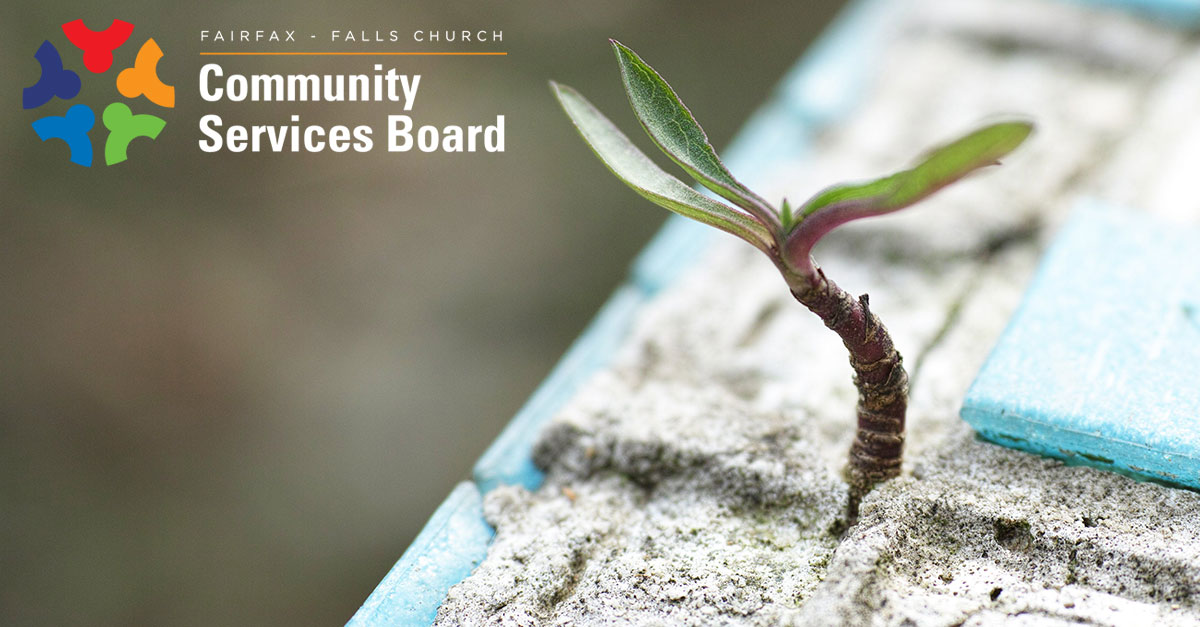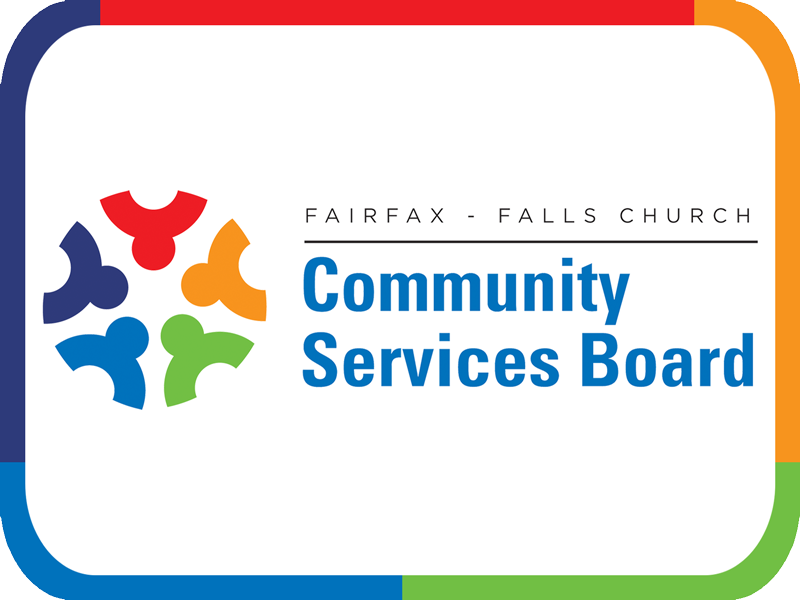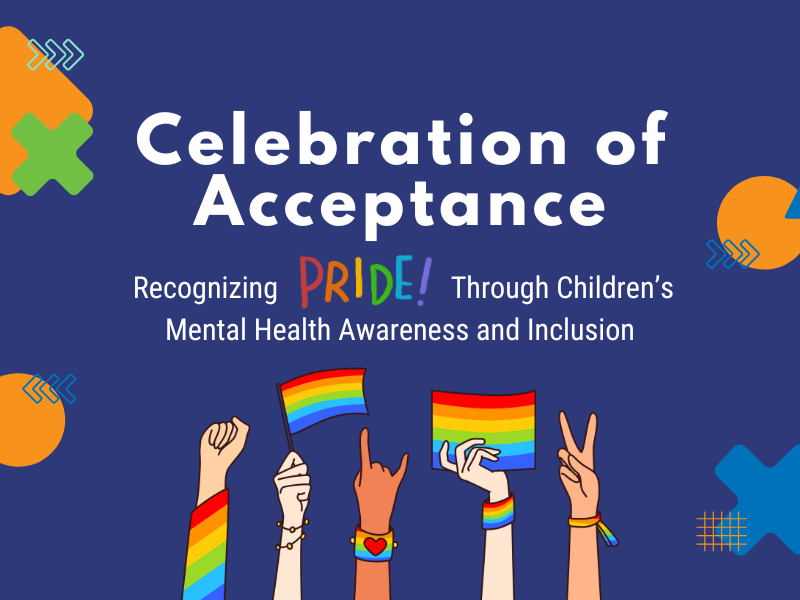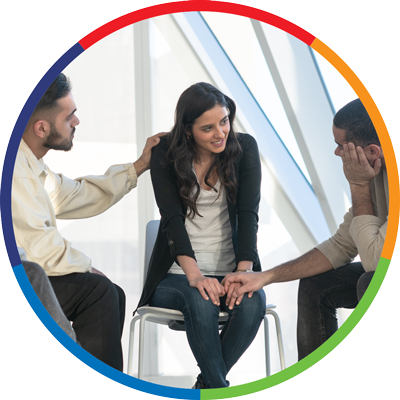June 12, 2024
The Fairfax County Board of Supervisors recognized June 2024 as "LGBTQ+ Pride Month" in Fairfax County at their June 11, 2024, meeting. This recognition was honored by a Proclamation presented to NOVA Pride. The County’s commitment to equality, inclusion and non-discrimination for LGBTQ+ residents is demonstrated by its One Fairfax Policy. Acceptance and inclusion of the LGBTQ+ community is valued at the Fairfax-Falls Church Community Services Board (CSB) as steadfast efforts bring awareness to the unique behavioral health needs of this population.
With acceptance and inclusion being paramount to building strong, resilient communities, Fairfax County agencies stand at the forefront of promoting these values. Harnessing a steadfast commitment to mental wellness and youth mental health, the CSB, the Fairfax County Department of Neighborhood and Community Services and Department of Family Services, and Healthy Minds Fairfax are proud to have made possible a "Celebration of Acceptance" on May 3, 2024. Held on a school holiday at the James Lee Community Center in Falls Church, Virginia, the event served as a beacon of hope, fostering a culture of acceptance while prioritizing the mental well-being of Fairfax County youth.
//-->
//-->
//-->
The Video Player does not directly support your device.
Please the link below the play in VLC, Quicktime, or other media player:
https://dl.ebmcdn.net/fairfax/flash/16AF_0524_CelebratAcceptance.mp4
//-->
//-->
//-->
The CSB Equity Team and CSB Youth and Family services partnered as lead planners, curating an exciting program aimed at empowering youth and promoting allyship within the community. Attendees were able to learn about various resources, programs, and organizations supporting the well-being of LGBTQ+ youth, as well as engage in discussions on acceptance and inclusion. The event is a testament to an enduring commitment to creating a more inclusive and supportive environment for all children and youth in Fairfax County.
The "Celebration of Acceptance" event featured free food trucks, special prize giveaways, a panel discussion, and numerous mental wellness activities. While targeted towards youth ages 13-18, individuals of all ages were welcomed. Parents, educators, and community members gained valuable insights and fostered allyship by participating.
Notable attendees included Fairfax County Board of Supervisors member Dalia A. Palchik (Providence District), who delivered a Proclamation marking May as "Mental Health Awareness Month" in Fairfax County. Also attending were Fairfax County School Board Chair Karl Frisch, Fairfax County Public Schools Superintendent Dr. Michelle Reid and CSB Executive Director Daryl Washington. Their presence underscored the importance of acceptance and inclusion in Fairfax County.
(Left) Attendees having fun during a Zumba session. (Right Top) Attendees included Fairfax County Public Schools Superintendent Dr. Michelle Reid; Fairfax-Falls Church Community Services Board leaders LaVurne Williams, Anika Harris, Barbara Wadley-Young, and Abbey May; Fairfax County Board of Supervisors member Dalia A. Palchik (Providence District); and Fairfax County School Board Chair Karl Frisch. (Right Bottom) A panel discussion featuring youth leaders and mental health specialists.
Initiatives like the “Celebration of Acceptance,” which aim to unite the community, align with the One Fairfax policy promoting equity and opportunity in Fairfax County, and the Healthy Minds Fairfax initiative, which works to improve mental health and substance use services for children and youth. In working to build bridges of understanding and foster inclusion, the event was an outlet for celebrating differences and creating a supportive environment to inspire minds and nurture hearts. It enabled young and old alike in Fairfax County to stand tall, together.
About the Fairfax-Falls Church Community Services Board: The Fairfax-Falls Church Community Services Board (CSB) provides services for people of all ages who have mental illness, substance use disorders and/or developmental disabilities. Its vision is that everyone in the community has the support needed to live a healthy, fulfilling life. Learn more about the CSB.
About CSB Youth and Family Services: The Fairfax-Falls Church Community Services Board (CSB) provides behavioral health services for children and youth who have serious emotional and mental health issues and/or substance use issues. Based on an individualized assessment, children, youth and families are offered a treatment plan tailored to their specific strengths and needs. Learn more about CSB Youth and Family Services.
About the Fairfax County Department of Neighborhood and Community Services: Neighborhood and Community Services promotes the well-being of individuals, families and communities by providing a variety of recreation, educational and developmental programs and services; by facilitating community engagement to identify areas of need and enhance countywide capacity for serving those needs; and by connecting residents with a continuum of county- and community-based resources that promote equity and create positive outcomes for people of all ages and abilities. Learn more about the Fairfax County Department of Neighborhood and Community Services.
About the Fairfax County Department of Family Services: The Department of Family Services envisions a community where everyone lives their success story and thrives. It strengthens the well-being of our diverse community by protecting and improving the lives of all children, adults, and families through assistance, partnership, advocacy, outreach, and quality services. Learn more about the Fairfax County Department of Family Services.
About One Fairfax: One Fairfax is a joint racial and social equity policy of the Fairfax County Board of Supervisors and School Board. It commits the county and schools to intentionally consider equity when making policies or delivering programs and services. Learn more about One Fairfax.
About Healthy Minds Fairfax: Healthy Minds Fairfax coordinates a full range of mental health and substance abuse services for children and youth across multiple county agencies, the school system and private treatment providers. It works to help youth and families in the Fairfax-Falls Church community access mental health and substance abuse services and improve the quality of those services. Learn more about Healthy Minds Fairfax.












